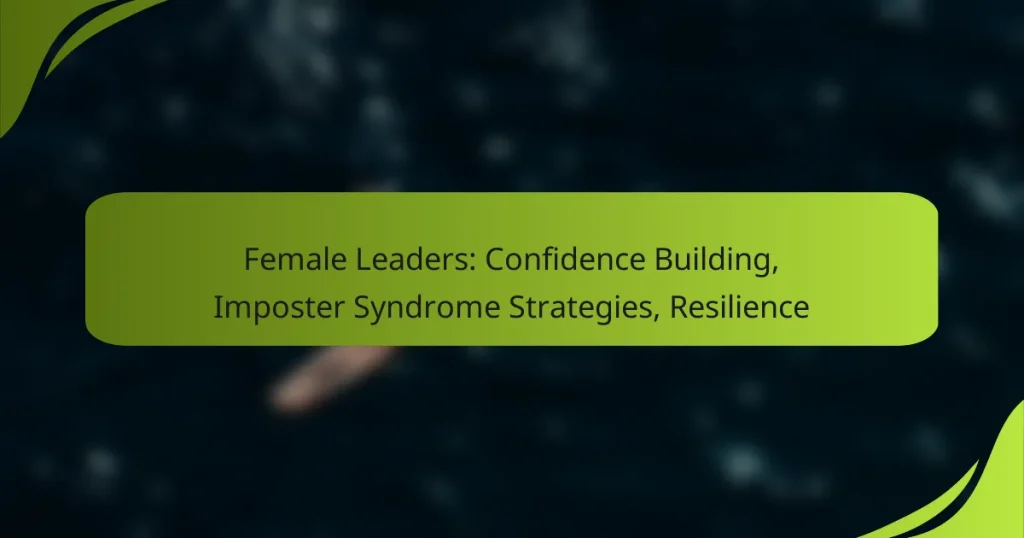Female leaders face unique challenges that require confidence, resilience, and strategies to combat imposter syndrome. By participating in workshops, seeking mentorship, and utilizing self-affirmation techniques, they can enhance their self-perception and leadership skills. Additionally, effective methods such as cognitive behavioral therapy and peer support can help overcome feelings of inadequacy, while resilience is built through self-awareness and strong support systems.

How can female leaders build confidence?
Female leaders can build confidence through targeted strategies that enhance their skills and self-perception. Engaging in workshops, mentorship, networking, and self-affirmation practices can significantly bolster their confidence levels.
Public speaking workshops
Public speaking workshops are effective for female leaders to enhance their communication skills and reduce anxiety. These workshops often provide practical exercises, feedback, and techniques to improve delivery and audience engagement.
Consider participating in local or online workshops that focus on storytelling and persuasive speaking. Regular practice in a supportive environment can lead to noticeable improvements in confidence when addressing larger groups.
Mentorship programs
Mentorship programs connect emerging female leaders with experienced professionals who can offer guidance and support. A mentor can provide valuable insights, share experiences, and help navigate challenges in leadership roles.
Seek out programs that match you with mentors in your industry or field. Regular meetings can foster a supportive relationship that encourages growth and boosts self-assurance.
Networking events
Networking events allow female leaders to build relationships and share experiences with peers and industry professionals. These gatherings can provide opportunities to learn from others, exchange ideas, and establish connections that may lead to career advancement.
Attend events that focus on women in leadership or industry-specific gatherings. Engaging with others can reinforce a sense of belonging and confidence in your abilities.
Self-affirmation techniques
Self-affirmation techniques involve recognizing and reinforcing your strengths and achievements. This practice can help combat feelings of inadequacy and imposter syndrome, which are common among female leaders.
Incorporate daily affirmations into your routine, such as writing down three accomplishments or positive traits each day. This simple practice can shift your mindset and enhance your overall confidence over time.

What strategies help overcome imposter syndrome?
Several effective strategies can help individuals overcome imposter syndrome, including cognitive behavioral therapy, peer support groups, journaling successes, and professional coaching. These approaches focus on building self-awareness, fostering supportive relationships, and enhancing personal growth.
Cognitive behavioral therapy
Cognitive behavioral therapy (CBT) is a structured approach that helps individuals identify and challenge negative thought patterns associated with imposter syndrome. By reframing these thoughts, individuals can develop a more realistic self-perception and reduce feelings of inadequacy.
Consider working with a licensed therapist who specializes in CBT. Sessions typically involve discussing specific experiences, identifying cognitive distortions, and practicing new ways of thinking. This process can lead to significant improvements in self-esteem and confidence.
Peer support groups
Joining peer support groups allows individuals to share experiences and strategies for overcoming imposter syndrome in a safe environment. These groups foster a sense of community, helping members realize they are not alone in their feelings.
Look for local or online groups that focus on women’s leadership or professional development. Regular meetings can provide accountability and encouragement, making it easier to confront self-doubt and build resilience.
Journaling successes
Journaling successes involves regularly documenting achievements, no matter how small, to reinforce a positive self-image. This practice helps counteract negative thoughts by providing tangible evidence of competence and capability.
Set aside a few minutes each week to reflect on accomplishments and positive feedback received. Over time, this habit can shift focus from perceived failures to real successes, enhancing overall confidence.
Professional coaching
Professional coaching offers personalized guidance to help individuals navigate their careers and overcome imposter syndrome. Coaches can provide tailored strategies, accountability, and support, helping clients set and achieve specific goals.
When selecting a coach, look for someone with experience in leadership development and a track record of helping clients build confidence. Sessions can be conducted in person or virtually, making it accessible regardless of location.

How do female leaders develop resilience?
Female leaders develop resilience through a combination of self-awareness, coping strategies, and support systems. By actively engaging in practices that strengthen their mental and emotional fortitude, they can better navigate challenges and setbacks.
Mindfulness practices
Mindfulness practices help female leaders cultivate present-moment awareness, reducing stress and enhancing emotional regulation. Techniques such as meditation, deep breathing, and body scans can be integrated into daily routines, requiring only a few minutes each day to be effective.
For instance, setting aside 10 minutes each morning for mindfulness meditation can significantly improve focus and clarity throughout the day. Apps like Headspace or Calm offer guided sessions that are accessible and user-friendly.
Stress management techniques
Effective stress management techniques are essential for building resilience. Female leaders can benefit from strategies such as time management, prioritization, and delegation to reduce overwhelm and maintain productivity.
Creating a daily schedule that includes breaks and setting realistic goals can help manage stress levels. Additionally, engaging in physical activities like yoga or jogging can serve as a powerful outlet for stress relief.
Goal-setting frameworks
Utilizing goal-setting frameworks, such as SMART (Specific, Measurable, Achievable, Relevant, Time-bound), can enhance resilience by providing clear direction and motivation. This structured approach allows female leaders to break down larger goals into manageable tasks, making progress more tangible.
For example, instead of aiming to “improve team performance,” a leader could set a SMART goal to “increase team productivity by 15% over the next quarter through weekly check-ins and feedback sessions.”
Adaptability training
Adaptability training equips female leaders with the skills to adjust to changing circumstances and unexpected challenges. This training often includes simulations and role-playing scenarios that enhance problem-solving abilities and foster a growth mindset.
Participating in workshops focused on change management can provide practical tools for navigating transitions. Leaders are encouraged to embrace flexibility and view setbacks as opportunities for learning and growth.

What role does mentorship play in leadership development?
Mentorship is crucial in leadership development as it provides guidance, support, and valuable insights from experienced individuals. Effective mentorship can help emerging leaders navigate challenges, build networks, and enhance their skills.
Access to industry insights
Mentors often have extensive experience and knowledge about industry trends, best practices, and potential pitfalls. This access allows mentees to gain a deeper understanding of their field, which can inform their decision-making and strategic planning.
For instance, a mentor in the tech industry might share insights on emerging technologies or market shifts, helping the mentee stay ahead of the curve. This knowledge can be invaluable for making informed career choices and developing innovative solutions.
Skill enhancement opportunities
Mentorship provides opportunities for skill enhancement through targeted feedback and practical advice. Mentors can identify areas for improvement and suggest specific resources or training programs that align with the mentee’s career goals.
For example, a mentor might recommend workshops or online courses to develop leadership skills, negotiation tactics, or technical proficiencies. This tailored approach ensures that mentees acquire the skills most relevant to their aspirations.
Building confidence through guidance
Receiving guidance from a mentor can significantly boost a mentee’s confidence. Regular check-ins and constructive feedback help mentees recognize their strengths and address their weaknesses, fostering a growth mindset.
Additionally, mentors can share their own experiences with overcoming challenges, which can inspire mentees to persevere through their own obstacles. This support system is essential for developing resilience and self-assurance in leadership roles.

How can organizations support female leaders?
Organizations can support female leaders by implementing targeted strategies that foster an inclusive environment, promote flexibility, and enhance leadership skills. By focusing on diversity, work-life balance, and training, companies can empower women to thrive in leadership roles.
Diversity and inclusion initiatives
Diversity and inclusion initiatives are essential for creating an environment where female leaders can flourish. Organizations should actively recruit women for leadership positions and ensure diverse representation at all levels. This can be achieved through mentorship programs, sponsorship opportunities, and regular diversity training.
To measure the effectiveness of these initiatives, companies can track metrics such as the percentage of women in leadership roles and employee satisfaction scores. Regular feedback from employees can also help refine these programs and address any gaps.
Flexible work arrangements
Flexible work arrangements can significantly enhance the ability of female leaders to balance professional and personal responsibilities. Options like remote work, flexible hours, and job-sharing can help women manage their time more effectively, leading to increased job satisfaction and productivity.
Organizations should assess the needs of their workforce and consider implementing policies that support work-life balance. For instance, providing parental leave and childcare support can make a substantial difference in retaining female talent.
Leadership training programs
Leadership training programs are crucial for equipping female leaders with the skills and confidence needed to succeed. These programs should focus on developing essential competencies such as strategic thinking, negotiation, and public speaking. Tailored workshops and coaching sessions can address the unique challenges women face in leadership roles.
Organizations can enhance these programs by incorporating real-world scenarios and peer networking opportunities. Encouraging participation in industry conferences and leadership forums can also provide valuable exposure and learning experiences for aspiring female leaders.

What are the key characteristics of resilient female leaders?
Resilient female leaders typically exhibit traits such as adaptability, confidence, and emotional intelligence. These characteristics enable them to navigate challenges effectively and inspire others in their organizations.
Confidence Building Strategies
Building confidence is essential for resilient female leaders. Techniques such as setting achievable goals, seeking feedback, and celebrating small wins can significantly enhance self-assurance. Engaging in public speaking or leadership training can also bolster confidence over time.
Networking with other women leaders can provide support and encouragement, reinforcing a sense of belonging and shared experience. Joining professional organizations or mentorship programs can create opportunities for growth and confidence building.
Imposter Syndrome Strategies
Imposter syndrome is common among female leaders, often leading to self-doubt despite evident success. To combat this, acknowledging achievements and reframing negative thoughts can be effective. Keeping a journal to document successes and positive feedback can serve as a reminder of one’s capabilities.
Additionally, discussing feelings of inadequacy with trusted peers or mentors can help normalize these experiences and provide perspective. Practicing self-compassion and understanding that perfection is unattainable can also alleviate the pressure associated with imposter syndrome.
Resilience in Leadership
Resilience in leadership involves the ability to recover from setbacks and maintain focus on long-term goals. Female leaders can cultivate resilience by developing a growth mindset, viewing challenges as opportunities for learning rather than obstacles. This perspective encourages persistence and adaptability in the face of adversity.
Establishing a strong support network is crucial for resilience. Surrounding oneself with positive influences and seeking advice from experienced leaders can provide guidance during tough times. Regular self-care practices, such as mindfulness or exercise, can also enhance emotional resilience and overall well-being.


